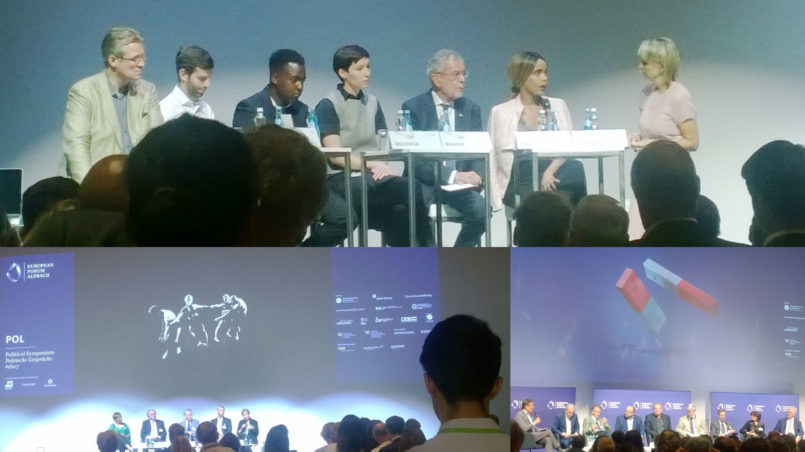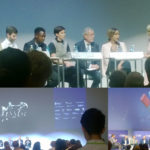Peace, Education and Self-Initiative – To Make the World a Better Place

It was a great honor for me to be one (or perhaps the only) Vietnamese participant at the European Alpbach Forum 2017. I attended the Political Symposium of the Forum, which took place from 27th to 29th August, 2017. This was a great opportunity for me to participate in a high level conference and to get to know Alpbach and the surrounding area.
In this year’s Political Symposium, with the focus on Conflict and Cooperation, I often came across the topic of “peace” and the role of education.
Peace is not everything but everything is nothing without peace.
At the opening session, Alexander Van der Bellen, the Austrian Federal President, emphasized tolerance as an important value in this changing world.
Michael von der Schulenburg, former Executive Representative and Head of Mission, UNIPSIL, at the plenary session, “Acknowledging reality: coming to grips with the international system”, shared his concerns on peace and conflicts: Why are many countries spending hundreds of millions of US dollars on weapons while they are not even at war? Why not spend money on building schools, hospitals … and keeping peace instead of on national defence?
Francesca Bria, Chief Technology and Digital Innovation Officer, City of Barcelona, during the plenary session, “Security and liberty in the digital future”, also introduced a broader understanding of the term “security”, which is not only limited to national security and defence.
She also suggested a peaceful approach to “cyber security” with “cyber peace” and “cyber love”, while other ministers of interior or security from Austria, Belgium and Estonia focused on tougher control measures to avoid cyber attacks. Again, the message is repeated:
The closing session, “Transformative pathways to sustainability: from perception to changing behaviour”, echoed the message of peace with the dance theatre performance “InDilemma”. The impressive, very interactive and engaging piece perfectly conveyed the role of cooperation in conflict resolution and in peace-keeping.
Yes, the message is clear. So what can we do about this? How can the message be spread and how can the world be changed?
Education is the most powerful weapon which you can use to change the world.
The session, “May I stay or should I go? The impact of climate change on migration” saw a lively discussion on the connection of climate change and migration. Alan Atkinson, the chairperson of the session, shared one reliable source that migration is considered one adaptation measure to climate change.
In reaction to this, all five speakers and audience shared their knowledge, experiences and best practices in dealing with climate change and in preventing migration because of extreme climate change consequences. In many aspects, the speakers and audience placed the importance on education, and empowerment for people in regions at risk of climate change as one of the long-term measures to resolve migration.
The role of education was repeated again in the session, “The Arctic: new narratives for a disputed territory?”. As an integrated part of the world, every change in the Arctic will affect everybody in any other place, and similarly, anything we do can result in changes in the Arctic. How can people learn about the Arctic? How can it be enjoyed but not harmed? How can we live in an eco-friendly way in general? … All that would start with education.
More than once, quite a few speakers also emphasized the role of the young generation, who can make changes in the future. I agree that the young generation would play a very important role, but I hope that the role of other generations, other people, will not be forgotten or denied.
You must be the change you wish to see in the world.
The forum, in my opinion, enriched its participants with its input and inspiration for change. Yet the more important point is how the participants could transform this inspiration into practice. We cannot maintain peace if we ourselves do not live in peace with others; we cannot stop global warming if we keep burning the globe; we cannot educate others about how to keep peace if we ourselves are not a good example. We have to start with ourselves if we want to change the world in the way we want.
Rosemary A. DiCarlo, President, National Committee on American Foreign Policy, New York concerned that the threat in the next ten years is not terrorism, or cyber insecurity, or war…but ourselves. If everyone was a little more tolerant with other people and the environment; if everyone was a little less selfish and greedy; if everyone had “a sense of responsibility” (Hans Bruyninckx, Executive director, European Environment Agency), the world would certainly become a better place.
If you want to see change you must first start within. It is that simple and it is that profound.
Mahatma Gandhi
And that is what the great leaders of the world, like Gandhi in India, Nelson Mandela in South Africa, or Ho Chi Minh in Vietnam, were known for.
In the short run, I will contact the dancers who performed the powerful theatre “InDilemma” to have their permission and guidance to carry out a similar art project in Vietnam to spread the message of peace. And my plan in the long run is to learn more about peace education and implement some practical projects in this field.
But I will not stop there.
If you want to go fast, go alone; if you want to go far, go together.
African Proverb
All in all, the Political Symposium was a great learning experience for me, not in terms of facts and information, but in terms of values and inspiration. And I am excited to continue my current work in the field of community development and to move on and achieve what I would like to do in the future, to contribute to a world of peace.
(Sources of pictures are here.)
Credits
| Image | Title | Author | License |
|---|---|---|---|
 |
Peace, Education and Self-Initiative… To Make the World a Better Place | Mai Nguyen Thanh | CC BY-SA 4.0 |
